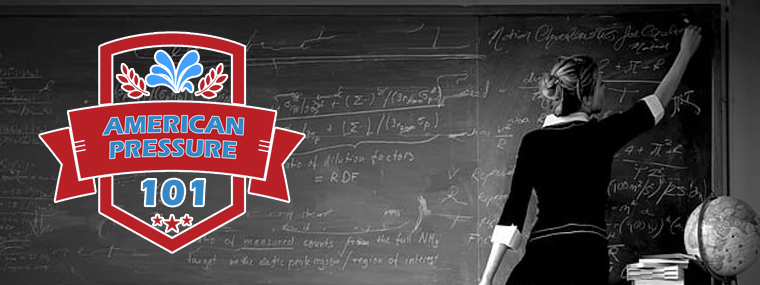American Pressure 101 (FAQs)
What does a pressure washer do? Is it just for cars? What's the difference between a hot water and cold water machine? What's with all the different parts? I'm so lost right now. What in the world is PSI? Ugh!
Feel lost? Don't be. There are lots of moving parts, technological jargon and options when buying or renting a pressure washer.
We are here to help. Welcome to American Pressure 101. Now sit down as we take you through the basics, we will keep it short and simple. We don't have a football team - but going forward you will know more about pressure washing, the machines and the everyday industries that depend on them.
We are here to help. Welcome to American Pressure 101. Now sit down as we take you through the basics, we will keep it short and simple. We don't have a football team - but going forward you will know more about pressure washing, the machines and the everyday industries that depend on them.
What are pressure washers used for?
A pressure washer can help you quickly clean large areas of all kinds of hard outdoor and indoor surfaces. You can use a pressure washer to spray off a wooden deck, siding, a car or truck as well as a concrete surface such as a patio, walkway or driveway. Many Industries use pressure washers daily.
What is PSI?A pressure washer can help you quickly clean large areas of all kinds of hard outdoor and indoor surfaces. You can use a pressure washer to spray off a wooden deck, siding, a car or truck as well as a concrete surface such as a patio, walkway or driveway. Many Industries use pressure washers daily.
PSI, or pounds per square inch, is the number most people are familiar with on a pressure washer. It's simply a measure of how much force the water hits with and helps you understand its ability to remove stuck-on debris.
Reliable on all the toughest jobs, pressure washers with 3,200 to 4,200 PSI offer enough power to strip away paint and remove the toughest stains.
Like the dishes in your sink, hot water “melts” grease and grime; cold water only pushes it around. On the other hand, if you're simply blasting away sand, caked-on mud, or even stripping paint, a cold water pressure washer will work just fine.
Pumps? What kind of oil do they need?
How hard water affects your Pressure Washer - what you can do to help combat scale...
How to keep pressure washer hose from getting tangled - a gun swivel is key!
Why is my Pressure Washer not spraying full pressure - Unloader or Pump Issues?
There are many possible reasons, with something simple as clogged filters. One place to start is replacing your unloader. If that does not solve the problem it is likely a pump issue where the pump needs to be rebuilt or replaced.
Comparing Pressure Washer GPM and PSI-which to choose?
Choosing the correct GPM and PSI combination depends on your application and how quick you want your cleaning time to be. We look at impact force as a great way to help show how different combinations of GPM and PSI equal a higher impact force which in turn means a quicker cleaning time.
Why is my Pressure Washer not spraying full pressure - Unloader or Pump Issues?
There are many possible reasons, with something simple as clogged filters. One place to start is replacing your unloader. If that does not solve the problem it is likely a pump issue where the pump needs to be rebuilt or replaced.
Comparing Pressure Washer GPM and PSI-which to choose?
Choosing the correct GPM and PSI combination depends on your application and how quick you want your cleaning time to be. We look at impact force as a great way to help show how different combinations of GPM and PSI equal a higher impact force which in turn means a quicker cleaning time.
Power Washer Vs Pressure Washer-What is the difference?
A power washer uses hot water & high-pressure streams to blast dirt and materials from surfaces. A power washer is better for removing grease, road film, and stuck on substances. A pressure washer uses cold water & high-pressure stream and is great for blasting dirt but won’t work well for stuck on surfaces.
The addition of heat to a pressure washer is key in speeding up cleaning time and removal of stuck on surfaces.
A power washer uses hot water & high-pressure streams to blast dirt and materials from surfaces. A power washer is better for removing grease, road film, and stuck on substances. A pressure washer uses cold water & high-pressure stream and is great for blasting dirt but won’t work well for stuck on surfaces.
The addition of heat to a pressure washer is key in speeding up cleaning time and removal of stuck on surfaces.
What size garden hose should I connect to a pressure washer to feed water to it?
We recommend a high quality rubber hose in 3/4″ in order to make sure the pressure washer is being fed enough water to not cause harm to the pump.
- LUNCH TIME - Take a break and relax and we will get right back to the wonderful world of Pressure Washing...
We recommend a high quality rubber hose in 3/4″ in order to make sure the pressure washer is being fed enough water to not cause harm to the pump.
- LUNCH TIME - Take a break and relax and we will get right back to the wonderful world of Pressure Washing...
Why Is My Pressure Washer Engine Not Running Smoothly?
Just like with other engines your pressure washer engine needs normal maintenance. Check your air filter to be sure that it is clear of any debris; if it is dirty, clean it if possible or replace it. You may also check your spark plug to see if it is worn or dirty, clean it if possible or replace it.
Winterization Procedure?
You can find a full blog about it HERE.
Fuel Comparison - Cost Per Hour to heat the water in your pressure washer...
Basic Fuel Types Used in Pressure Washers:
Natural Gas: Cost per Therm (100,000 BTUs) = $0.835/therm
Propane: Cost per Gallon (91,452 BTUs) = $1.52/gallon
Electricity: Cost per kWh (3412 BTUs) = 0.159/kilowatt hour
Kerosene: (138,000 BTU per gallon) = $2.67 gal delivered, $4.00 gal at pump, $10+ gal off store shelves
Diesel Fuel: $2.67 / gal at the pump
Cost per Hour for the fuel to heat the water:
Natural Gas: $1.87
Propane: $3.73
Electricity: $8.38
Fuel Oil: $4.36
rates from Jan/Feb 2021
Just like with other engines your pressure washer engine needs normal maintenance. Check your air filter to be sure that it is clear of any debris; if it is dirty, clean it if possible or replace it. You may also check your spark plug to see if it is worn or dirty, clean it if possible or replace it.
Winterization Procedure?
You can find a full blog about it HERE.
Fuel Comparison - Cost Per Hour to heat the water in your pressure washer...
Basic Fuel Types Used in Pressure Washers:
Natural Gas: Cost per Therm (100,000 BTUs) = $0.835/therm
Propane: Cost per Gallon (91,452 BTUs) = $1.52/gallon
Electricity: Cost per kWh (3412 BTUs) = 0.159/kilowatt hour
Kerosene: (138,000 BTU per gallon) = $2.67 gal delivered, $4.00 gal at pump, $10+ gal off store shelves
Diesel Fuel: $2.67 / gal at the pump
Cost per Hour for the fuel to heat the water:
Natural Gas: $1.87
Propane: $3.73
Electricity: $8.38
Fuel Oil: $4.36
rates from Jan/Feb 2021
What Is The Best Pressure Washer Tool For Cleaning Driveways & Sidewalks? Try a Surface Cleaner?
A surface cleaner is a tool that has a spinning spray bar with a high-pressure hose attached to it. They come in a variety of shapes and sizes. The spray bar has two or more angled nozzles that provide the propulsion that spins the bar. The high-pressure spray comes out of the nozzles as the spray bar is rotating.
A surface cleaner is a great tool for cleaning sidewalks, driveways, or any flat surface that needs to be cleaned. With many sizes available, a surface cleaner can significantly speed up the cleaning time.
A surface cleaner is a tool that has a spinning spray bar with a high-pressure hose attached to it. They come in a variety of shapes and sizes. The spray bar has two or more angled nozzles that provide the propulsion that spins the bar. The high-pressure spray comes out of the nozzles as the spray bar is rotating.
A surface cleaner is a great tool for cleaning sidewalks, driveways, or any flat surface that needs to be cleaned. With many sizes available, a surface cleaner can significantly speed up the cleaning time.
What Size Surface Cleaner Can I Use? Surface Cleaner Sizing & Choosing A Surface Cleaner
Sizing a surface cleaner to your pressure washer is based on gallons per minute of the machine. Call us to find out what size and style of surface cleaner will work best for your machine.
Sizing a surface cleaner to your pressure washer is based on gallons per minute of the machine. Call us to find out what size and style of surface cleaner will work best for your machine.
Want more of the best pressure washing tips? Stay tuned to our blog and newsletter!

